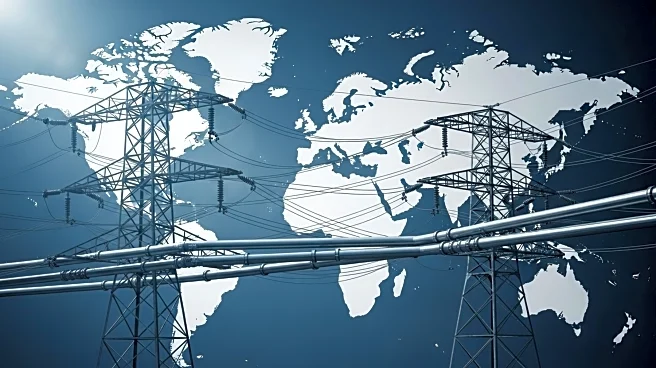What is the story about?
What's Happening?
The G7+ group convened an emergency meeting on October 4, 2025, in response to Russia's intensified attacks on Ukraine's oil and gas facilities. This meeting was organized by the Energy Ministry to address the urgent needs of Ukraine as it faces increased threats to its energy infrastructure. The G7+ energy coordination group was initially established in November 2022 to support Ukraine's energy sector amidst ongoing Russian aggression. The recent meeting included representatives from over 100 nations and international organizations, such as the U.S., Canada, Germany, France, the European Commission, and the United Nations Development Programme. The meeting followed a significant Russian attack on October 3, which targeted Ukraine's oil and gas infrastructure. Serhii Koretskyi, CEO of Naftogaz, described the attack as the largest mass assault on Ukraine's gas mining infrastructure since the war began. Deputy Energy Minister Roman Andarak briefed the G7+ partners on the attack's impact and outlined Ukraine's priority needs for repairing damaged facilities.
Why It's Important?
The emergency meeting underscores the critical situation facing Ukraine as it prepares for the winter season. Russia's strategy of targeting Ukraine's energy infrastructure aims to disrupt civilian life and demoralize the population by plunging cities into darkness and cold. The G7+ group's commitment to supporting Ukraine's energy needs is vital for maintaining stability and resilience in the face of these attacks. The provision of air defense systems, additional gas volumes, and repair equipment is essential to counteract the damage and ensure the continuity of energy supplies. The ongoing support from international partners highlights the geopolitical significance of Ukraine's energy security and the broader implications for European energy stability. Russia's continued aggression poses a threat not only to Ukraine but also to regional security and the global energy market.
What's Next?
The G7+ representatives have pledged to continue providing energy support to Ukraine and plan to hold another meeting soon to coordinate these efforts. The focus will be on enhancing Ukraine's air defense capabilities and ensuring the availability of necessary resources for infrastructure repairs. As winter approaches, the urgency of these measures increases, with the potential for further Russian attacks on Ukraine's energy network. The international community's response will be crucial in mitigating the impact of these attacks and supporting Ukraine's resilience. Additionally, there may be diplomatic efforts to pressure Russia into ceasing its aggressive tactics and engaging in peace talks.
Beyond the Headlines
The situation in Ukraine highlights the ethical and humanitarian dimensions of warfare targeting civilian infrastructure. The deliberate attacks on energy facilities raise questions about the legality and morality of such tactics in conflict. The international community's response reflects a commitment to upholding human rights and supporting nations under siege. Long-term, the conflict may drive innovations in energy security and resilience, as countries seek to protect critical infrastructure from similar threats. The geopolitical landscape may shift as alliances strengthen in response to shared security challenges.
















